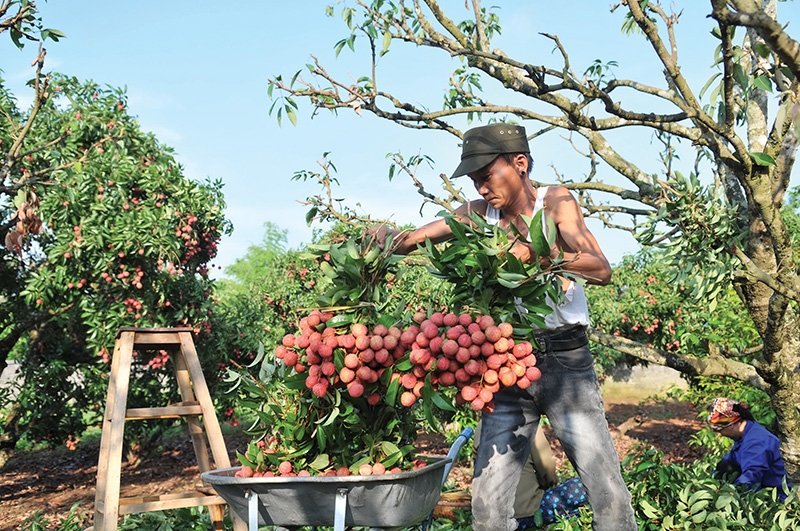Deeper funding key for agri-processing
 |
| The MARD wants to speed up customs clearance for agricultural products and promote peak-season trade. Photo: Shutterstock |
According to Hoang Ba Nghi, member of the Central Steering Committee for VietGAP, Vietnam is experiencing an overproduction due to the rapidly increasing output of agri-products. Meanwhile, businesses pay little attention to market research in agriculture, and very few businesses make investments in the processing stage, so Vietnam mainly sells raw products with low value.
During the current lychee season, local authorities and management agencies have mobilised stakeholders to ensure output of fresh lychees and minimise negative effects on farmers. The Ministry of Industry and Trade said that Vietnam has exported about 100 tonnes of fresh lychees to Japan, the US, Australia, France, the Czech Republic, and China this season.
In 2020, exported lychees got stuck at the border gates in large quantities, causing damage to businesses. Thus, the Ministry of Agriculture and Rural Development (MARD) has been more proactive amid this year’s lychee crop as the resurgence of the pandemic could lead to the isolation of some lychee-growing provinces.
The MARD has established working groups to support provinces in accelerating customs clearance for products. It also sent dispatches to relevant ministries to seek cooperation and promote the trade flow of agri-products in the peak season. Some measures have been adapted to facilitate the transport of agri-products including an extension of the working time, eased administrative procedures, reduced transportation fees, and the issuance of certificates for disease safety. Another measure has been to diversify distribution channels by selling agri-products on e-commerce and digital platforms.
However, these are all just short-term solutions to increase the output for agri-products. In the long term, Vietnam may need to invest heavily in deep processing to help farmers avoid falling prices despite the bumper harvest seasons. According to the government’s Resolution No.53/NQ-CP dated July 17, 2019 on solutions to encourage and promote enterprises to invest in agriculture, Vietnam aims to be among the top 15 countries with the most advanced agriculture worldwide, and among the world’s top 10 in terms of processing by 2030.
Post-harvest processing is also crucial to increase value of agri-products and reduce losses, helping businesses actively find consumption markets and earn higher revenue. However, since 2017, localities have attracted only around 70 projects in agri-forestry-fishery processing, with total capital of $2.56 billion.
Meanwhile, fishery by-products are a valuable source of raw materials for processing value-added products. Vietnam’s total seafood output reaches about seven million tonnes per year, of which fishery by-products account for about 15-20 per cent (about one million tonnes).
Phan Thanh Loc, vice chairman of Vietnam Food JSC, said that many developed countries soon realised the potential of the industry and successfully developed high-added value seafood by-products. He said Vietnam has a target of $10 billion for shrimp exports by 2025 with a total shrimp output of over 1.15 million tonnes. However, only 55-65 per cent of the shrimp’s value has been exploited while the remaining 35-45 per cent is often discarded.
MARD Minister Le Minh Hoan said at a conference last week that only 20-30 per cent of Vietnam’s agri-products are processed before being sold to the market. Meanwhile, this figure is nearly 80 per cent in Taiwan. “Thus, the sector needs to compare and formulate a development plan to create added value for agri-products, meant to solve the oversupply issue and reduce pressure on farmers,” Hoan said.
According to Hoan, the government needs to work with businesses to connect them with consumers as well as conduct more research. It is also necessary to pay more attention to cooperatives and also smaller players in order to promote logistics, post-harvest preservation, and processing technology.
What the stars mean:
★ Poor ★ ★ Promising ★★★ Good ★★★★ Very good ★★★★★ Exceptional
Related Contents
Latest News
More News
- Hermes joins Long Thanh cargo terminal development (February 04, 2026 | 15:59)
- SCG enhances production and distribution in Vietnam (February 04, 2026 | 08:00)
- UNIVACCO strengthens Asia expansion with Vietnam facility (February 03, 2026 | 08:00)
- Cai Mep Ha Port project wins approval with $1.95bn investment (February 02, 2026 | 16:17)
- Repositioning Vietnam in Asia’s manufacturing race (February 02, 2026 | 16:00)
- Manufacturing growth remains solid in early 2026 (February 02, 2026 | 15:28)
- Navigating venture capital trends across the continent (February 02, 2026 | 14:00)
- Motivations to achieve high growth (February 02, 2026 | 11:00)
- Capacity and regulations among British areas of expertise in IFCs (February 02, 2026 | 09:09)
- Transition underway in German investment across Vietnam (February 02, 2026 | 08:00)

 Tag:
Tag:




















 Mobile Version
Mobile Version